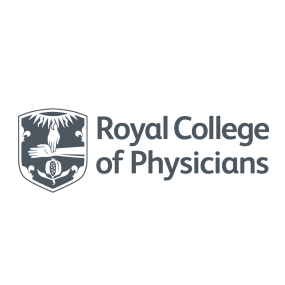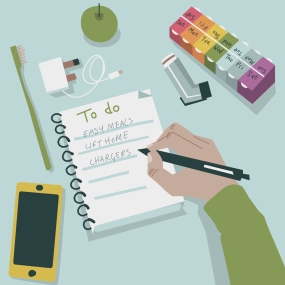Practical preparation
Practical Preparation
Many people find it difficult to think about life beyond their operation or may not know what to do. This webpage is to help provide support to people to get through the days and weeks following surgery.
Many people find it difficult to think about life beyond their operation or may not know what to do. All staff involved in perioperative care should be aware of the concepts and some specific tips for the time after surgery. This webpage has practical ideas, resources and experience from staff, organisations and patients.
Whilst each person is unique, some things happen in patterns. It can be empowering for patients to know what to expect. This information is relevant for both elective and emergency operations. Having clear information and feeling in control may enable people to focus offers of help from family, friends and neighbours.
It can be helpful to consider how to manage each of the basic activities of daily living (ADLs) to get through the days and weeks following discharge.
| Basic Activities of Daily Living (ADLs): | Suggestions: |
|
Can you get flannels? |
|
Will you need a raised seat? For night-time: check you have a clear route. Consider getting a bottle or female equivalent |
|
Bad arm in first. Baggy Tshirts. Elasticated trousers. Sturdy, comfortable footwear with a non-slip sole. |
|
Food that is easy to prepare. Move things to waist height in the kitchen. |
|
Consider a shoulder bag or rucksack and a thermos flask for drinks. |
|
Practice your “sit-to-stand” exercises before surgery, so this is easier. You may need a raised chair. Where is your bed located in your home, does it need to be moved downstairs? |
- Medication – order your repeat medication if it will be due around the time of your admission; if you don’t normally take painkillers buy simple over the counter painkillers e.g., paracetamol or ibuprofen for afterwards (on discharge check if it is okay to take them with any new medications that have been started)
- Childcare
- Petcare
- Equipment – see www.livingmadeeasy.org.uk
- Entertainment – craft work, books, phone chargers
- Consider shoes to walk around in
- Long charging cables
- Baggy clothes
- Transport – look up bus routes for when you cannot drive or cycle.
- Offers of help – tell friends and family what you need (eg cleaning or shopping).
- How to get out every day. Keep moving regularly.
There are more complex tasks that patients might wish to think about in advance, including:
- Preparing meals
- Managing money
- Shopping and consideration of food deliveries
- Doing housework
- Use of technology for communication
- Housekeeping
- Laundry
- Transportation (getting lifts, using buses)
- Taking medication
Supporting patients to prepare from a practical perspective
Below you will find tools and links to resources to help patients prepare for surgery. The resources and blog include more practical details. Highlights include: preparing meals may involve batch cooking and freezing, frozen meals or commercial food deliveries; managing money includes knowing what bills may come in. Consider shoes to walk around in, long charging cables, baggy clothes and entertainment. CPOC wants the whole perioperative team to think about practical preparation for the days and weeks after surgery – so every patient gets the best possible future.

Use this checklist with your patients, to ensure they have all the information they need about their medications.
Going into hospital for an operation can be a worrying time. Share this checklist with your patients to help them prepare.

- This video from Worcestershire Acute Hospitals NHS provides tips for patients on how to prepare their home.
- Jenny Lancaster, a Specialist Occupational Therapist from East Sussex Healthcare NHS Trusts shares some tips on preparing your home .

Find out more and join the #EndPJparalysis campaign. Let's get patients out of bed, moving and back homer with their loved ones.

Active Hospital aims to change the physical activity culture within hospitals to encourage patients to move more. Click here to look at their toolkit to create your own Active Hospital.

Video content and in-depth information relating to the patient experience of some of the major hip and knee procedures carried out by the Orthopaedic team at the Hampshire Hospitals NHS FT: Hip and Knee tv
Total hip replacement - Occupational Therapy Advice for Safe Discharge- includes how to get in and out of a car after surgery

Lift up your everyday - managing energy | RCOT is occupational therapy advice for managing energy with extreme fatigue from the Royal College of Occupational Therapists


Macmillan Cancer support shares advice on practical issues such as work, benefits, childcare and pet care for patients with cancer undergoing treatment wit
Read our blog from CPOC Deputy Director Scarlett McNally for more tips on practical preparation
We welcome more tips, tricks, videos and resources from previous patients or experienced professionals!
This page is intended to support people having operations to make practical preparation for their surgery. Keeping people mobile, strong and active reduces complications. If you have any resources you would like to share please contact us at CPOC@rcoa.ac.uk.

